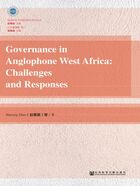
1.1 Introduction
This chapter discusses the nature, prospects and challenges of public administration in five Anglophone West African countries. These countries are The Gambia, Ghana, Liberia, Nigeria and Sierra Leone. They all belong to a 15-member Economic Community of West African States (ECOWAS), established in May 1975 to promote sub-regional integration. Democratic governance in particular, though not yet in full swing in all countries in the region, is increasingly emerging as the preferred way of political life. They are all practising multi-party democracy and the presidential system of government with elections being held after the stipulated expiration of the term of office of both the President and Parliament. Economically, even though four out of the five countries (with the exception of The Gambia) are natural-resource-rich ones, their governments are struggling to put their economies on an even keel in spite of implementing the Bretton Woods institutions’ structural adjustment and poverty reduction programmes. They are also grappling with the volatile world market prices of their primary commodities. The intention to set up an ECOWAS Second Monetary Zone with a common currency, the Eco in 2015 and join the Francophone First Monetary Zone of the CFA to establish an ECOWAS Single Monetary Zone has not been realized because many countries could not meet the criteria.Socially, poverty exists in the countries while the gap between the rich and the poor continues to deepen. The achievement of the Millennium Development Goals (MDGs) now called Sustainable Development Goals (SDGs) in most of the areas is behind schedule. In spite of programmes to promote diversity, exclusiveness (gender disparities and other social cleavages) still exists as manifested in the number of women who hold public office in the five countries and access of the poor to goods and services. The perception of corruption in these countries is high despite national and international response to deal with the problem[1].
The public sector has been a key player in the formulation and implementation of strategies, policies, and programs to promote growth, improve education, create wealth, increase health care, and in recent years, implement poverty reduction strategy programs, and work to enhance the living standard of their citizens. However, there are complex and daunting developmental challenges facing Anglophone West African societies with respect to an effective and efficient public sector. Indeed, the important question is how Anglophone West African societies can overcome the obstacles to public sector reforms and improve performance of the sector? This chapter involves exhaustive literature review of previous studies on public sector reforms in Anglophone West Africa. The reviews encompass purely scholarly research, technical reports, country case studies and Government documents. The analysis of studies was supplemented by in-depth interviews through face-to-face, skype, telephone and via e-mail of key stakeholders in the public sector. These included individuals in leadership positions with insights and first-hand experience in public sector reform in the five Anglophone West African countries.
The intent of this chapter is to produce a qualitative study supported by insights and comparative analysis of practical experiences and theoretical knowledge to make significant contributions to public administration in West Africa. It is expected that the conclusions of this study will generate new ideas that will not only contribute to the ongoing academic debate but also generate some possible solutions that will lead to a significant improvement in the public service performance in Anglophone West Africa.